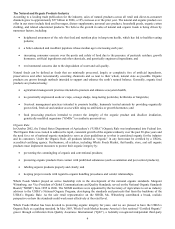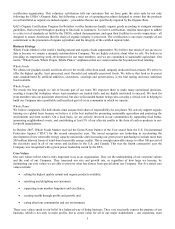Whole Foods 2007 Annual Report Download - page 20
Download and view the complete annual report
Please find page 20 of the 2007 Whole Foods annual report below. You can navigate through the pages in the report by either clicking on the pages listed below, or by using the keyword search tool below to find specific information within the annual report. 14
We own two produce procurement centers which facilitate the procurement and distribution of the majority of the produce
we sell. We also operate a national meat purchasing office, a confectionary, four seafood processing and distribution
facilities, a specialty coffee and tea procurement and brewing operation, and nine regional distribution centers, which
distribute a full range of products to our stores across the U.S., Canada and the United Kingdom. In addition, we have five
regional commissary kitchens and 11 bakehouse facilities, all of which distribute products to our stores. Other products are
typically procured through a combination of specialty wholesalers and direct distributors.
United Natural Foods, Inc. is our single largest third-party supplier, accounting for approximately 24% of our total purchases
in fiscal year 2007. In November 2006, we extended our long-term relationship with United Natural Foods as our primary
supplier of dry grocery and frozen food products. Our seven-year agreement allows us to concentrate our capital and
resources on executing on our new store development pipeline and to focus our internal distribution efforts around key
perishable departments including produce, prepared foods, bakery, seafood and meat.
Marketing
We spend much less on advertising and marketing than conventional supermarkets – approximately 0.5% of our total sales in
fiscal year 2007. Instead, we rely primarily on word-of-mouth recommendations and testimonials from our shoppers, as well
as the publicity and excitement generated by our new store openings. We allocate our marketing budget among region-wide
programs, our individual stores’ marketing efforts, and a national brand awareness initiative focusing primarily on national
in-store marketing programs and national and major-market public relations. Our stores spend most of their marketing
budgets on in-store marketing-related activities, including signage and in-store events such as taste fairs, classes, tours and
product samplings. To create goodwill and develop a high profile within the community, each store also has a separate
budget for making contributions to a variety of philanthropic and community activities. We presently contribute at least 5%
of our after-tax profits in the form of cash or products to not-for-profit organizations.
Customer Service
Customers are our most important stakeholder, because without our customers, we would have no business. We genuinely
care about the well-being of our customers and empower our team members to do whatever it takes to meet or exceed their
expectations on every shopping trip. By doing so, we turn our customers into advocates for our business, who do more than
shop with us; they recommend Whole Foods Market to their friends and others. We want to serve our customers
competently, efficiently, and knowledgeably. We believe that we generate greater appreciation and loyalty from our
customers by educating them about natural and organic foods, health, nutrition and the environment through our in-store
“Take Action” centers as well as on our corporate website at www.wholefoodsmarket.com, which features hundreds of
recipes and a library of information about environmental, legislative, food safety, and product quality issues.
Team Members
As of September 30, 2007, we had approximately 52,600 team members, including approximately 44,900 full-time, 5,200
part-time and 2,400 temporary team members. Of the total, approximately 6,000 were Wild Oats Markets team members,
including approximately 3,700 full-time, 2,000 part-time and 300 temporary team members. We are proud that 90% of our
permanent team members are full-time team members, which we believe is very high for the food retailing industry and
allows us to better serve our customers.
One of our core values is supporting team member happiness and excellence, and we believe our innovative and egalitarian
work environment with team members involved at all levels of our business is a major reason for our success. We believe
happy team members create happy customers, and happy customers create happy investors. Team members who have a voice
in shaping the direction of our Company and their future are empowered to make Whole Foods Market not only a great place
to shop but a great place to build a career. All of our full-time and part-time team members are eligible to receive stock
options. In addition, team members are encouraged to take an active role in choosing the benefits made available by the
Company by participating in a Company-wide benefits vote every three years. The Company’s second vote was held in fiscal
year 2006 to determine the benefits program that will be in place from 2007 through 2009. Approximately 77% of eligible
team members voted in this important process, resulting in a benefits package that reflects the needs and desires of the
majority of team members in the Company. One outcome of the vote is that Whole Foods Market provides healthcare at no
cost to eligible full-time team members. Eligible full-time team members are those who work 30 or more hours per week and
have worked a minimum of 800 service hours. Dependent healthcare premiums are shared based on a team member’s tenure
with the Company; the team member’s share decreases as his/her tenure increases.
For the past 10 years, our team members have helped Whole Foods Market become one of Fortune magazine’s “100 Best
Companies to Work for in America.” In scoring companies, Fortune places the greatest weight (two-thirds of the total) on
responses to a random survey of 400 employees, with the remainder being Fortune’s evaluation of each company’s
























